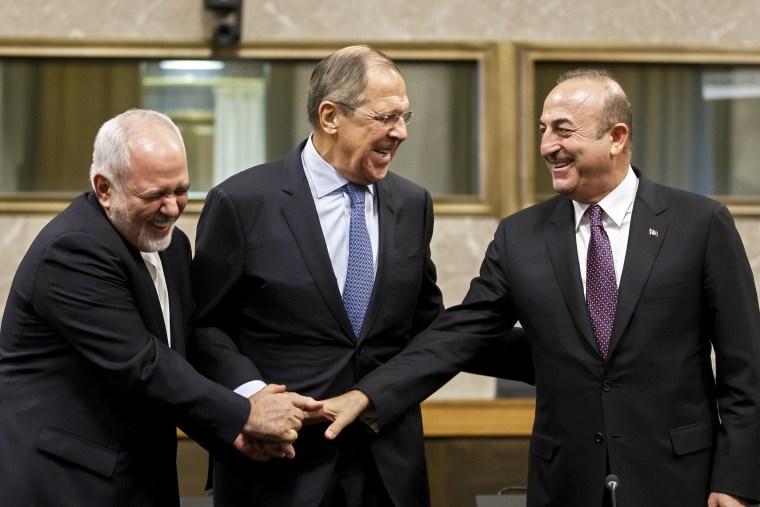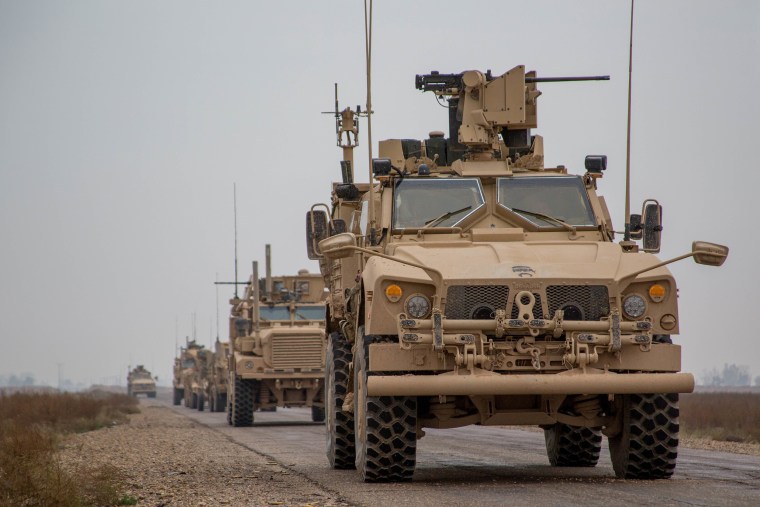WASHINGTON — President Donald Trump's abrupt decision to withdraw U.S. troops from Syria will be hailed as a victory in Russia and Iran and a betrayal among Kurdish and Arab opposition forces that have waged a seven-year war against the Damascus regime, experts and former officials say.
Although Russian and Iranian forces had already turned the tide of the civil war in favor of Syrian President Bashar al-Assad, the presence of U.S. troops has served as an obstacle to their ambitions and a source of leverage for Washington in any potential political settlement of the conflict.
Just within the last week, senior U.S. officials had argued that the American military mission was needed to ensure the lasting defeat of ISIS militants and to serve as a bulwark against Iran.
But with Trump's move to pull out the U.S. troops, Russia and particularly Iran — which sent thousands of proxies and its own elite forces into Syria — stand to emerge as the dominant players in a country that shares a border with Israel.

The withdrawal, if carried out, will "provide Iran with solid control over the entire arc of the Levant from Baghdad to Beirut," said Nicholas Heras, Middle East security fellow at the Center for a New American Security think tank.
Iran already wields significant influence next door in Iraq, where it has heavily backed Shiite militias and cultivated close ties to the Shiite-ruled government.
Israel's ambassador to the United Nations, Danny Danon, said the presence of Iranian forces in Syria posed a threat to his country.
"We have our concerns about Syria, about the presence of Iranian troops in Syria. And we will do whatever is necessary to protect our people regardless if you have American troops, Russian troops, or any other nations," Danon told reporters.
The roughly 2,000 U.S.troops in Syria, first deployed in 2015 on President Barack Obama's watch, helped Kurdish-led forces deliver a resounding defeat against Islamic State extremists that at one point held large swaths of territory. Now the Islamic State is severely damaged and is holed up in the Euphrates River valley.
But senior U.S. officials and commanders have warned that the fight against ISIS is not over and that without more help and training from American troops, the extremists could regroup and return to the fray.
The U.S. military's top officer, Gen. Joseph Dunford, said this month that training for local forces in Syria was still at an early stage, while stabilization efforts still had "a long way to go."
Kurdish forces in Syria, which proved a reliable partner for the U.S. military's fight against ISIS, will almost certainly feel betrayed by Trump's move, experts said, and will now face a potential onslaught by Turkish forces that could jeopardize their hold on territory in the northeast.
"The U.S. withdrawal means handing over our necks to Turkey's knives," said a Syrian Kurd, speaking to NBC News from the town of Rmelan in northeastern Syria, near the Abu Hajar air base used for years by U.S. forces.
"My mother is crying on the phone. I feel that my heart will stop," he said, speaking on condition of anonymity out of concern for his safety.
Arab opposition forces fighting the Syrian regime also have relied heavily on U.S. special operations forces to help pinpoint air raids and to guide them on the battlefield. Once the American commandos leave, the Arab fighters could be vulnerable to Assad regime forces, Russian warplanes, and Iran-backed fighters as well as ISIS militants, experts and officials said.

A contingent of the Arab fighters is stationed at a key base set up by U.S. troops in the southeast. The Al-Tanf base straddles a strategic route that links Baghdad with Damascus and Beirut. U.S. officers privately refer to it as a "speed bump" for both terrorists and Iran's proxy forces.
Even by the standards of the impulsive Trump presidency, the decision came as a shock to American allies and to his Cabinet, raising fresh questions abroad about America's reliability.
Trump opted to withdraw U.S. troops despite opposition from nearly every member of his national security team. In an indication of the chaotic, last-minute nature of the move, top lawmakers, administration officials and foreign allies were blindsided by the announcement. Even the U.S. special envoy for Syria, Joel Rayburn, was caught off guard, and had to cancel his attendance at a private event Wednesday morning in Syria just a few minutes in advance, said a source familiar with the matter.
The withdrawal puts members of the Trump team in the uncomfortable position of breaking the promise of a continued U.S. presence in Syria that reassured U.S. allies such as Israel, the Kurds and Gulf Arab states. The president's recently named special representative for Syria engagement, Amb. James Jeffrey, had said repeatedly and publicly as recently as this week that the U.S. was not walking away from Syria and that the military would stay.
Ironically for Trump, who has sought to portray his foreign policy as the opposite of Obama's, the decision prompted comparisons to his predecessor. As a candidate, Trump hammered Obama for being the "creator of ISIS" because Obama had withdrawn U.S. troops from Iraq, a decision blamed for creating a power vacuum that allowed ISIS to take hold and then spread to Syria.
"This is Obama 2.0," said Mark Dubowitz, head of the hawkish Foundation for Defense of Democracies, which has urged the administration to remain in Syria as a counterweight against both the Islamic State and Iran. "It's amazing how Trump just doesn't understand how the guy he doesn't want to be like, he's being exactly like."
Less clear is why Trump decided now to withdraw, and for what reasons.
Although Trump had expressed impatience with the U.S. presence in Syria dating back to his time as a candidate, his aides and foreign leaders had convinced him to stay. After Trump earlier this year mused about pulling out during midterm campaign rallies, senior military leaders joined foreign countries including Israel, Saudi Arabia and the United Arab Emirates in a full-court press to him to hold off, officials and others briefed on the conversations said.
But Trump had long been pushed to pull out by Turkey, a NATO ally at odds with the U.S. in Syria over American backing for Kurdish forces that the Turks consider terrorists. Turkey's influence with the U.S. has increased in recent weeks following the release by Turkey of American pastor Andrew Brunson and by the murder in Istanbul of journalist Jamal Khashoggi in the Saudi consulate by a hit team sent by Saudi Arabia's government.
Trump's hopes of maintaining close U.S. ties to Saudi Arabia and its young leader Crown Prince Mohammed bin Salman gave additional leverage to Turkish President Recep Tayyip Erdogan, whose government adeptly demonstrated that it had damning intelligence about the killing that could be either leaked or kept quiet.
A turning point for Trump appears to be his phone call Friday with Erdogan, which a U.S. official said had made clear that Trump was never truly committed to staying in Syria. Another senior administration official who briefed reporters Wednesday said that Trump had merely informed Erdogan in the call of a decision he'd already made.
Although it's unclear what else Trump and Erdogan may have agreed to during the call, a number of thorny issues between Turkey and the U.S. appear to be heading toward resolution at the same time.
Erdogan had been threatening an imminent new military operation into Syria, where Turkish attacks against Kurds could have risked a potentially deadly confrontation with U.S. troops who are working in close quarters with the Kurdish fighters. Trump's decision to withdraw averts that risk.
Washington has also been at odds with Turkey over its planned purchase of the S-400 missile defense system from Russia, which would trigger U.S. sanctions on Turkey and pose major problems for NATO. Late Friday, the State Department announced plans to approve a sale of U.S.-made Patriot missiles — an alternative to the S-400 — to Turkey's government.
It's unclear whether Turkey will agree to drop its S-400 sale and purchase only the American-made Patriot missiles instead. Nor is it clear whether the timing of the approval, just before Trump's Syria decision, was coincidental.
Two congressional aides said that the proposal to sell the missiles to the Turks had been awaiting informal sign-off from top lawmakers overseeing foreign affairs for some time. They said that the last remaining holdout, Sen. Bob Menendez, D.-N.J., had finally given his permission for the sale on Tuesday following efforts to persuade him by Secretary of State Mike Pompeo and others.



